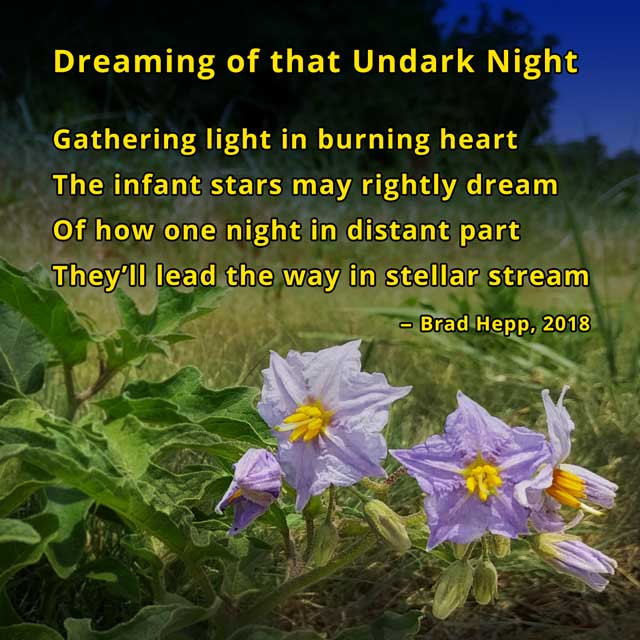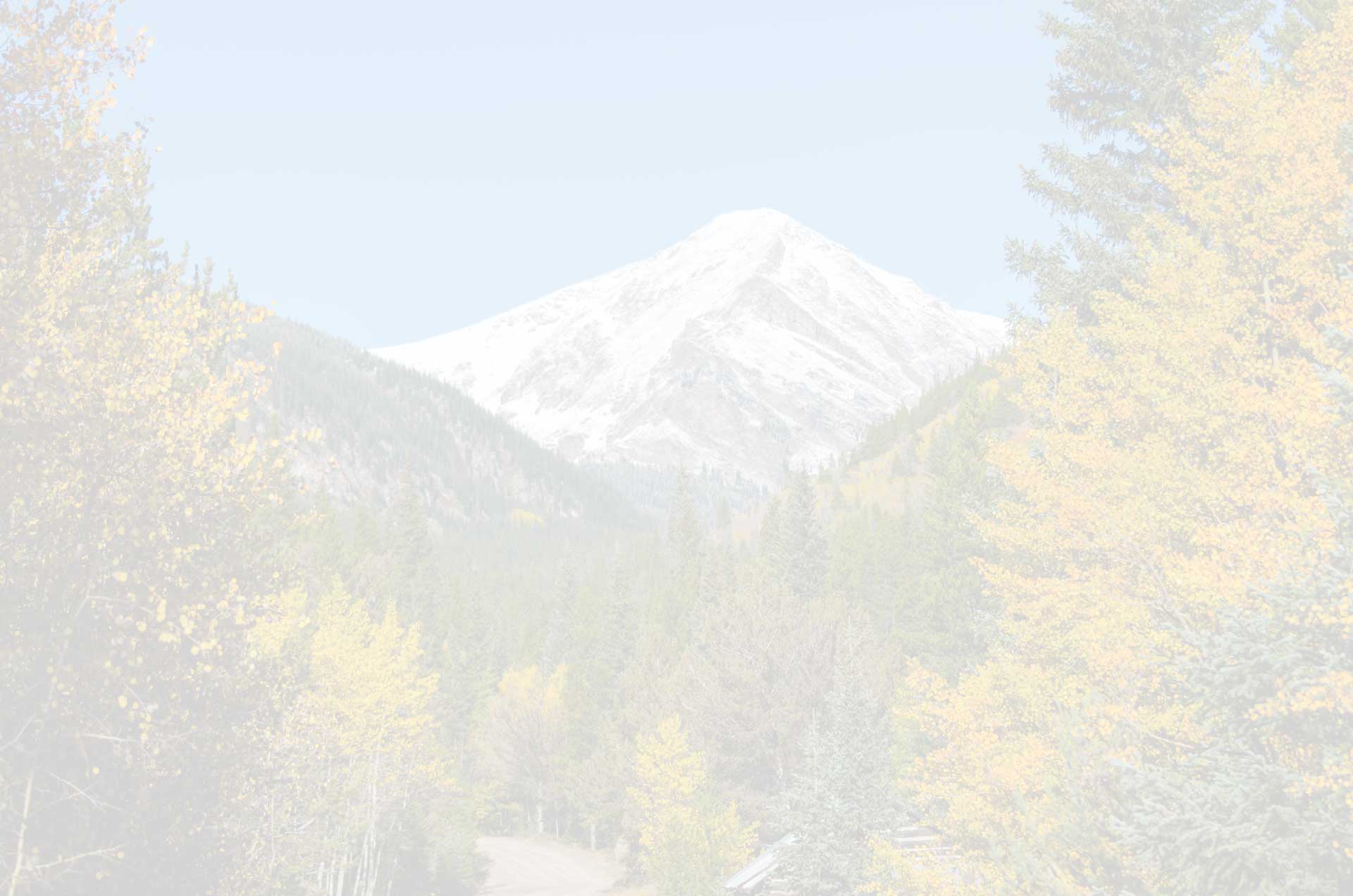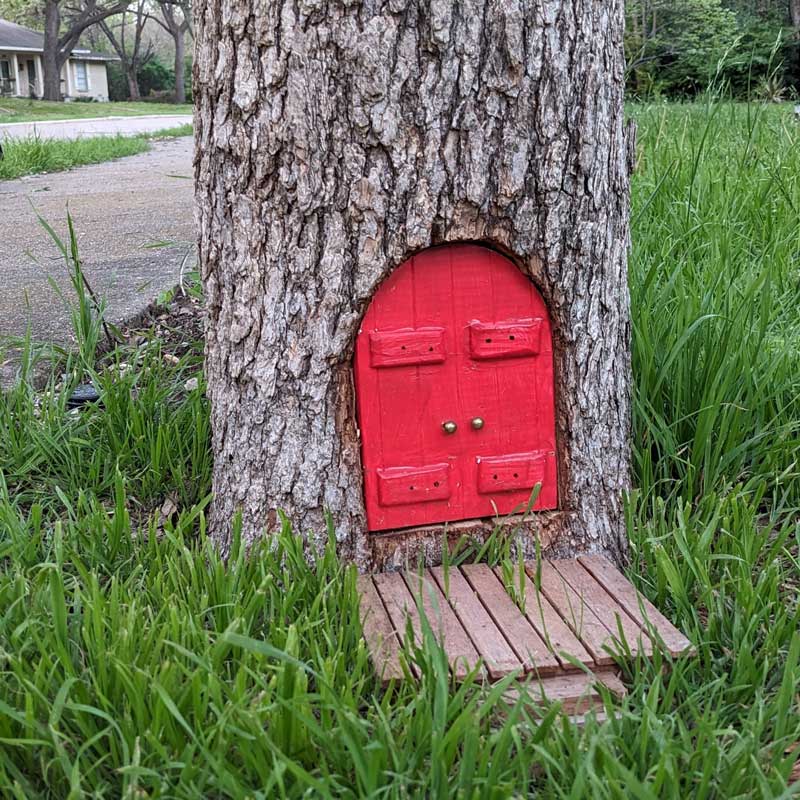
OUT FOR A WALK
Why didn’t I think to knock?
Perhaps I would have met
A genteel sort of squirrels
Who curtsy when they talk!
— Brad Hepp, 3/25/2024
a digital commonplace book

OUT FOR A WALK
Why didn’t I think to knock?
Perhaps I would have met
A genteel sort of squirrels
Who curtsy when they talk!
— Brad Hepp, 3/25/2024
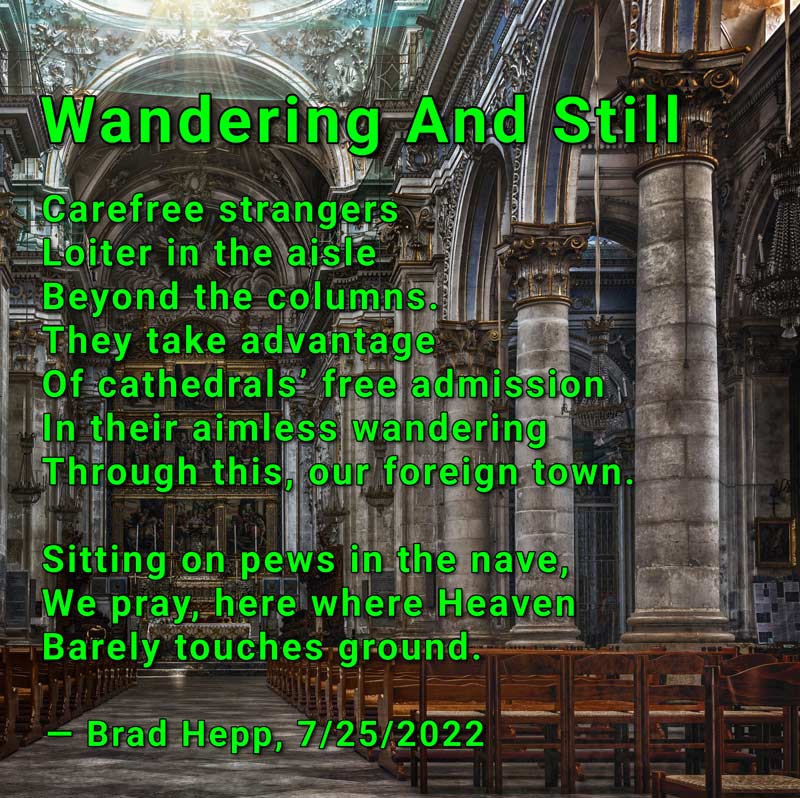
I have witnessed this scene often, but mainly from the aisles.
(background image by “Tama66” on Pixabay)
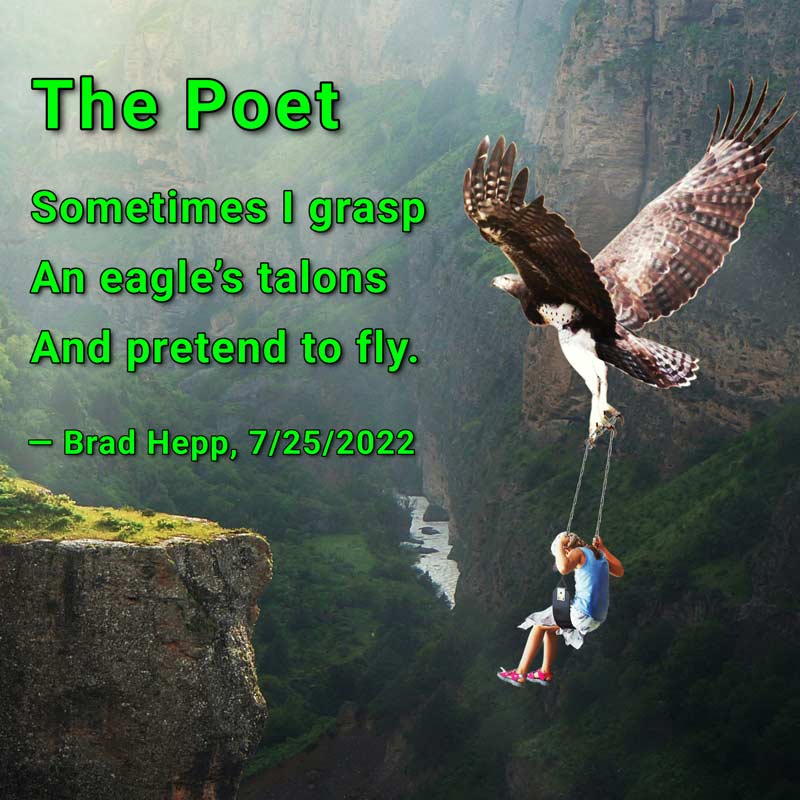
Don’t be fooled by the playful image. The key word in this poem is “pretend.” There are many times when I realize that I’m not fully conscious of meaning in my own poems. That seemed like a sorry excuse for sloppy writing when I was younger. Now, I increasingly recognize that I don’t grasp so much as I am grasped.
(background image by Lothar Dieterich on Pixabay)
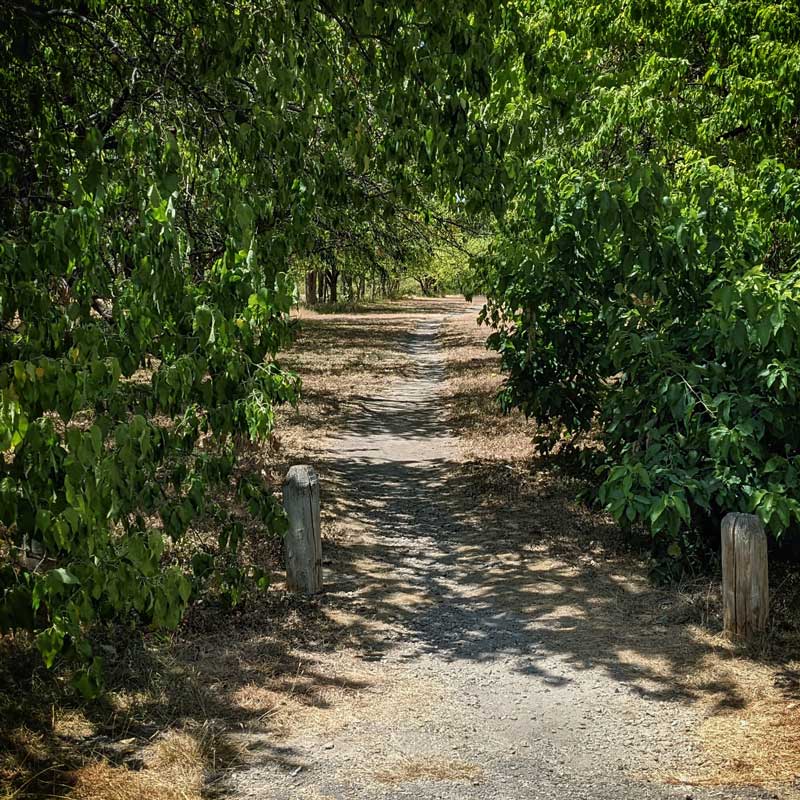
ME: (referring to the photograph above) No matter how many times I walk under these bois d’arc trees on my shortcut to the lake, it feels like I’m entering a special place, or embarking on an adventure. What are the magical places and moments in your life?
JOSH VAJDA: When I was a teen, we had 10 acres of forest and brush behind the house, with paths winding through. My favorite part of the walk was in the back corner on just the right winter’s day. After a hairpin turn in the brush, you walked along the side of a patch of older trees, which soon sharply turned right, inviting you inside, and winding so you could not see too far ahead. With a fresh blanket of heavy, wet snow, it was truly magical. The frosted pine and birch towered above, while the brush heavy laden hugged the path. The sun lit the chamber like a cathedral, and the snow smothered every sound except the crunch beneath your boots and the swish of your winter coat. Sometimes I would just stand in the center and soak it in as long as I could.
ME: Josh, you have written elsewhere about the importance of imagination. In the space set apart, the cathedral, we begin to imagine how everything could be different. As you describe that magical place from your youth, I want to map it out in my head. If I were sitting with you, I’d ask you to sketch the scene. I want to locate that cathedral and enter it myself. Those of us who have read Lewis think immediately of a wardrobe in an old professor’s house. But we should probably find our own wardrobes. Then, what is it we encounter in the set-apart space? To define it seems only to diminish it.
JOSH VAJDA: As usual, you are correct. I couldn’t help feeling it had a certain Narnian magic to it.
ME: This one’s for Josh Vajda (an echo of your elevated prose):
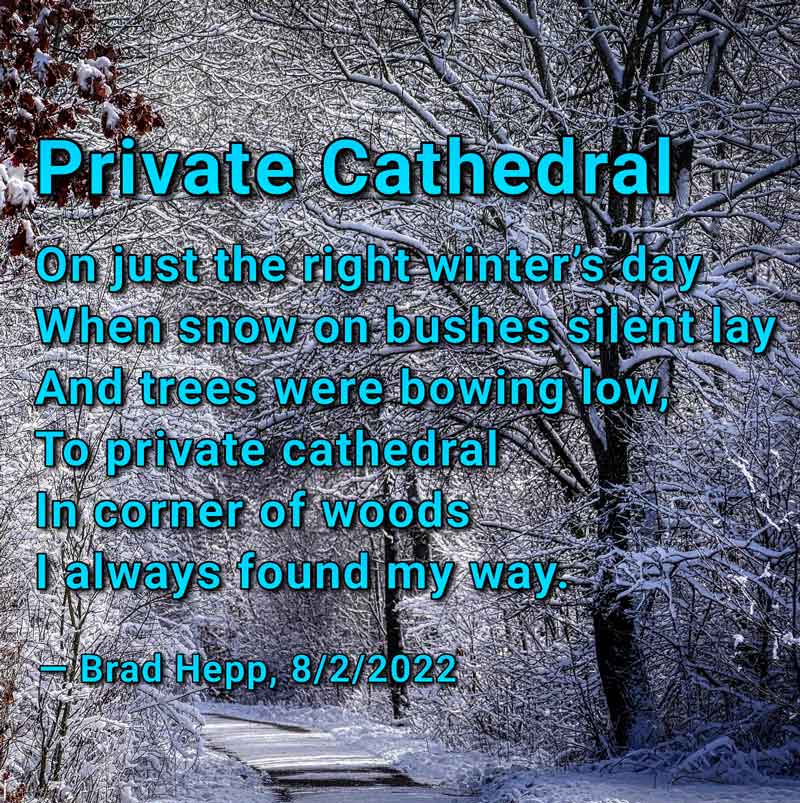
[Note: Josh Vajda kindly gave me permission to include our Facebook exchange in this post. Josh is an excellent thinker and writer. Check out his blog. For instance, this study of “The Sin of Sodom.”]
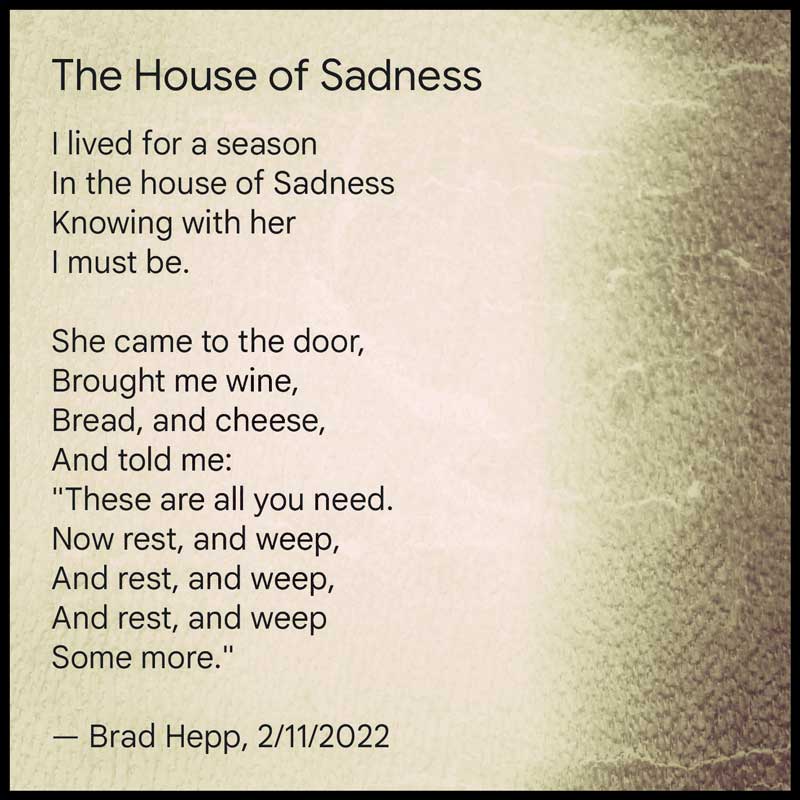
Recently, one of my ongoing projects has been peeling back layers of personal, church, and world history in order to better comprehend this world’s fallenness. I felt a certain compulsion about it. I needed to feel sadness about the many insults to God’s purpose and His image in man. I needed to feel sorrow about ways that I participate in those insults.
On a recent Sunday evening, I hit pause on the project. I thought, “Enough of this for now. I’m not feeling the compulsion.”
Was I done with exploring sadness? I don’t think so. It was just a rest. My heart still has chambers of ungodly anger that must be flooded instead with compassion. Like the Pharisees who despised the Lord of the Sabbath, I look for fault with His followers. I treasure offense at His disciples’ trespasses. Like the Pharisees, I need to understand what this means: “I desire mercy, and not sacrifice” (see Matthew 12). Then, perhaps, I will not be so quick to condemn.
SO, WEEP SOME MORE
I had just finished writing this poem (and was pretty broken up by the process of writing it) when Susan came in and told me that an old friend — a GOOD and brilliant man — now has Alzheimer’s. My sadness turned to sobbing.
“Now rest, and weep,
And rest, and weep,
And rest, and weep
Some more.”
I can’t help but think that this season in the house of Sadness is what I should expect as a follower of Jesus. It’s on the path to becoming compassionate, like He is compassionate.
He was despised and rejected by men, a man of sorrows and acquainted with grief; and as one from whom men hide their faces he was despised, and we esteemed him not.
Isaiah 53:3 ESV
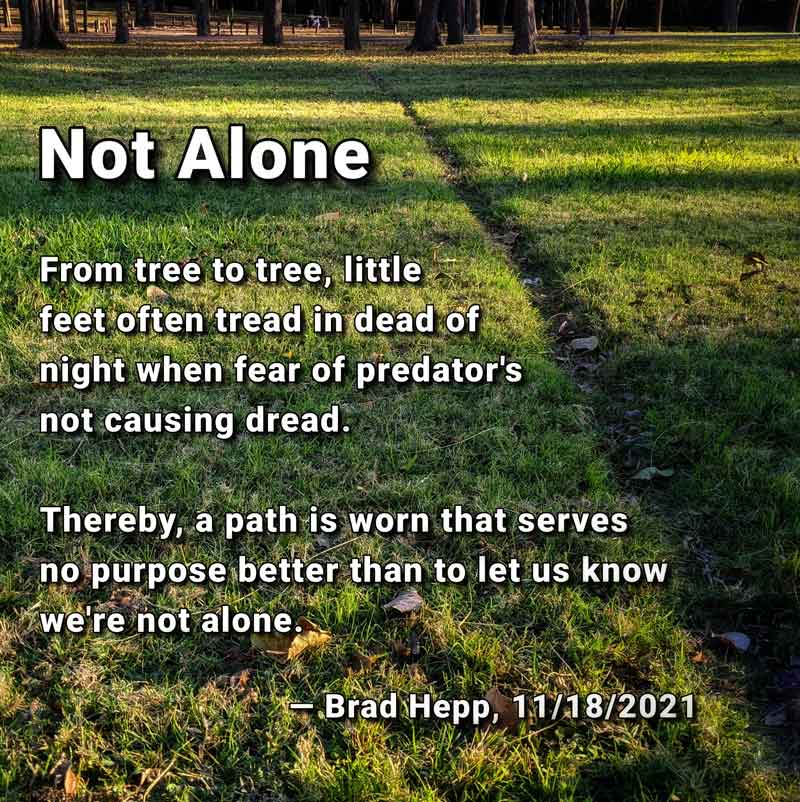
These little trails have always intrigued me, be they in the mountains or in a local park. Why do they evoke such strong emotion?
Seriously… I took the photo, walked another 200 yards, and sat down on a park bench to edit the photo and pen a few words. Then, as I continued walking home, I felt a tremendous lump in my throat. Why?
As I have revealed before, I’m seeing a counselor to help me explore what may be some deep-seated emotional “problems.” I don’t say that with shame. Frankly, I think we all have deep-seated emotional “problems.” I just have the luxury right now of exploring mine.
One of the things my counselor has encouraged me to do is to try to figure out what relationship some of my poetry has to my life story. Now that’s a good challenge for a poet!
Really a problem?
Is it really a problem that I get inexplicably emotional? After all, what do we expect of someone God crafted to be a poet? If a poet cannot feel deeply, and desire with determination to express that emotion, what hope is there for any of us? God is an intelligent designer. We are not random results of happenstance. God has a purpose for making us as He did.
I can’t read this out loud now. Maybe tomorrow….
A related poem: “Not Alone“
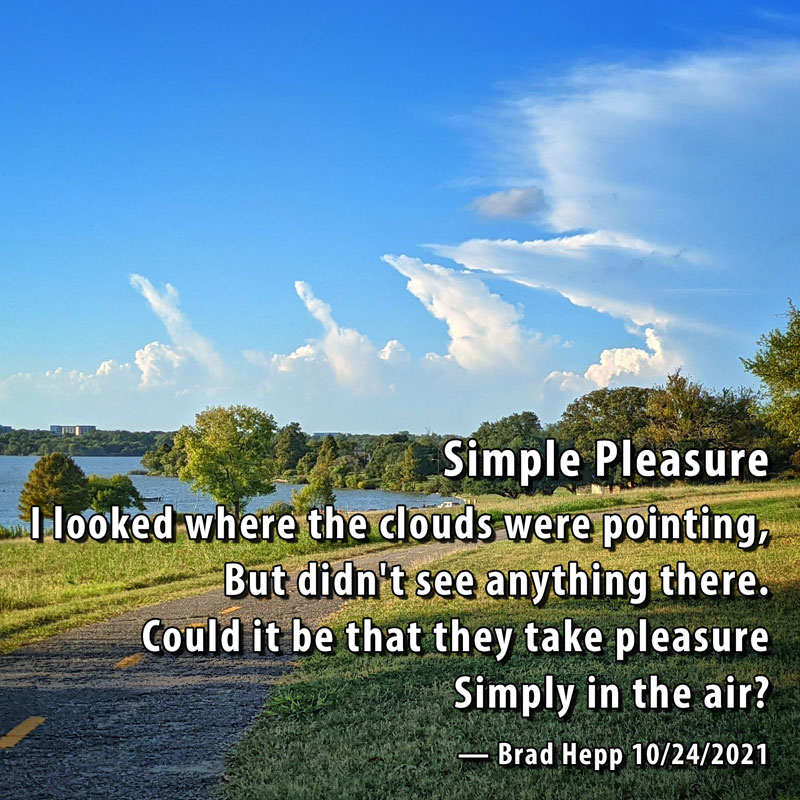
There must have been some interesting conditions in the sky over Dallas yesterday. A little after I took this photo of clouds with finger-like extensions, I noticed the formation of mammatus clouds* a little to the East.
So, I wanted to share the photograph, and to confess that I actually looked to where the clouds seemed to be pointing.
Is that silly?
I suspect most adults would have looked for where the lines converged just as I did. But only if they haven’t killed off a God-given imagination and sense of the transcendent. We expect nature to communicate something — for very good reasons.
The heavens declare the glory of God, and the sky above proclaims his handiwork.
Psalm 19:1
Disappointed?
So, I didn’t see a rider in the sky. But the conclusion of my little poem is not anti-supernatural. Rather, it’s based on a notion that creation is continually celebrating the pleasure and provision of a good Creator. Are you? Am I?
Related Poem
I’m not sure HOW this poem is related, but I thought of it when writing the above: “A Meditation.” Also, see “Voice Lessons.”
*From www.whatisthiscloud.com: “Mammatus clouds are formed the same way cumulus clouds are formed, but in reverse. They are formed by sinking cold air that form pouch-like figures as they’re carried into a warmer layer of air, contrary to the puffs of clouds rising through the convection of warm air.”
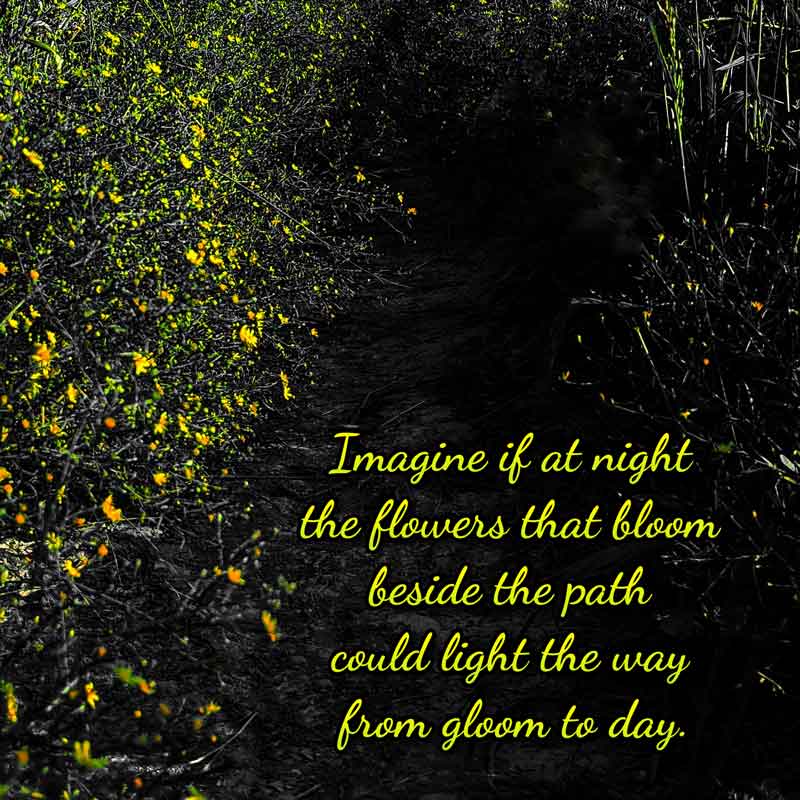
I’m not aware of any deep meaning in this.* I had taken a photo of broomweed by the path and began editing it, trying to help the viewer see the yellow flowers standing out as much in the photograph as they did in my eye. Stereoscopic vision is a magnificent gift. With it, we isolate objects from their background. Flowers stand out from foliage. That’s what we SEE. But most photographs fail to convey their subject in three dimensions — photographic images are flat.** In this photograph, there was little separation between the yellow flowers and the green foliage, especially in the yellow light of late afternoon.
So…. I was editing. And the more that I edited, the more I isolated the yellow flowers from their background. Eventually, I pushed all but yellow to black. That’s when I thought of the line, “Imagine if at night….” Phosphorescent flowers…. Wouldn’t THAT be something?!
THE ORIGINAL, AND A MEMORY
Below is the original photograph. And here’s a memory about broomweed:
When I was a teenager, I got to help the gardener at a camp I was working at in Mexico. One day we drove to the other side of the lake where Cayo gathered stiff little bushes that we fashioned into brooms and rakes. I recall that they worked better than the store-bought ones.
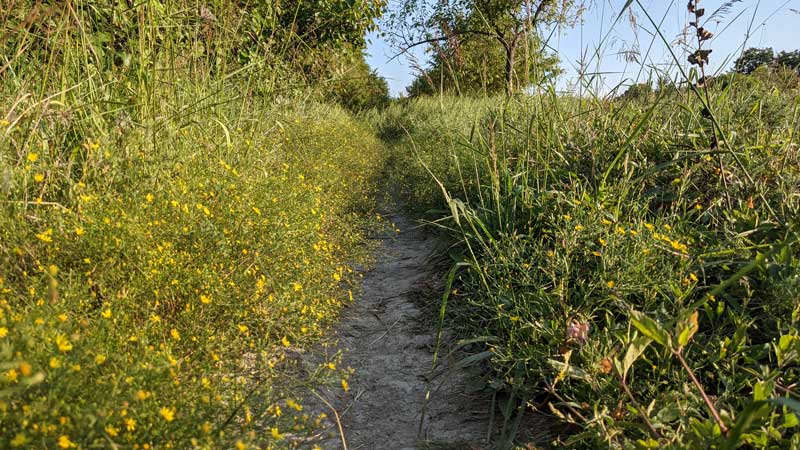
*On the other hand, one could easily make the case that all beauty in creation illumines our path to understanding a beautiful Creator.
**Incidentally, this is part of why I insist that in editing photographs, “you have to lie to tell the truth.” That is, you have to lie about what the camera captured in order to tell the truth of what our magnificent vision captured.
[written April 14]
At a gasoline station this morning, the driver of the truck at the pump next to mine opened his door, and the truck’s alarm began blaring. I immediately thought, “I’d love to be where the loudest thing I hear’s a crow!” This poem is about the unpleasantness of distrust when provision and purpose are broken. It’s so much of our lives….
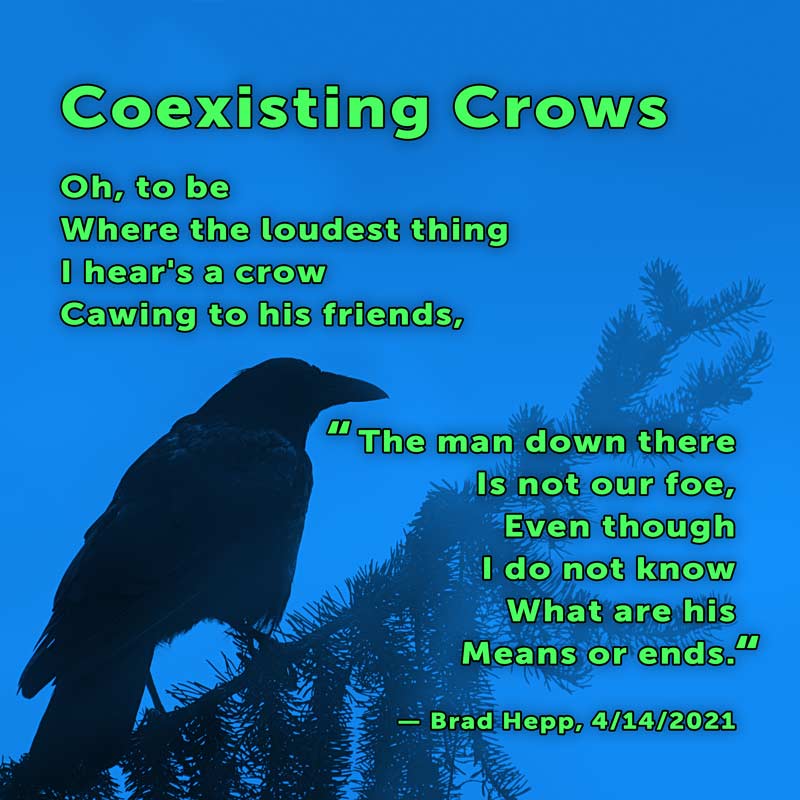
This poem is a bit of (hopefully) sanctified imagination. Please don’t take it as a theological statement! However, if it fires up some thoughts you’d like to discuss, let’s do so… either privately via my contact form, or more publicly, with the comments form below.
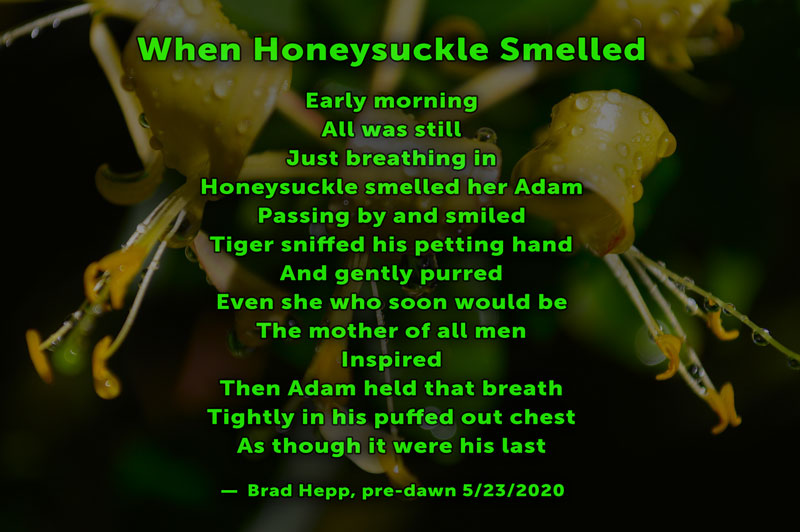
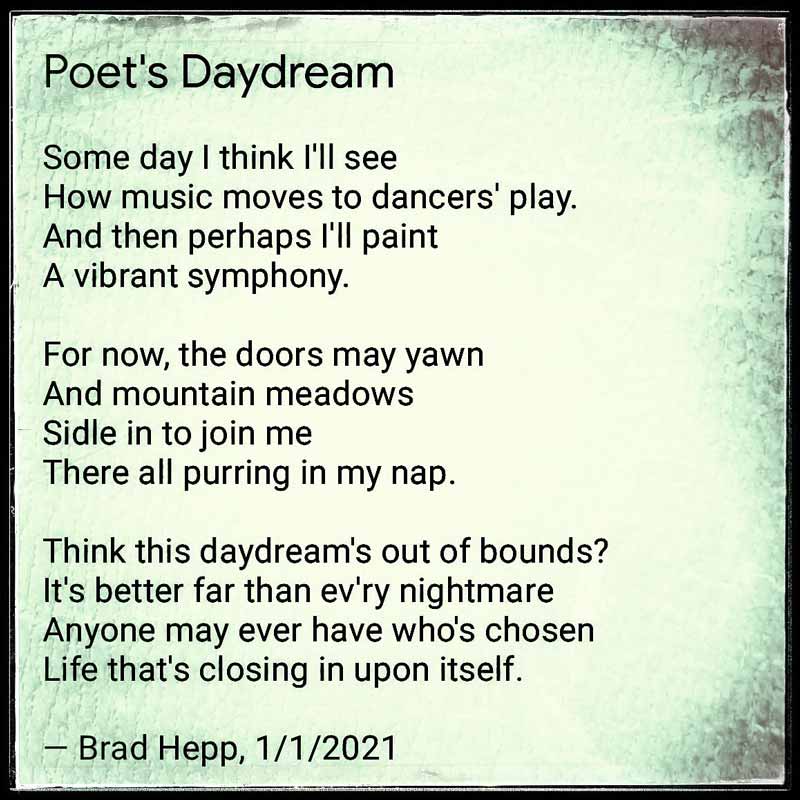
DON’T HATE ME FOR THIS
Almost every day, I take an afternoon nap while listening to music. I try hard then to let my imagination wander free. Often, I think of other artists, and the grasp they have of beauty. I, too, have known beauty. Someday, all of us who know the Author of beauty will have unbridled joy in His creation. Nap time is a good time to savor that hope. In Him, we rest.
Uncultured, but never uncouth, the lowly wildflower has inestimable worth to those who can see it.
